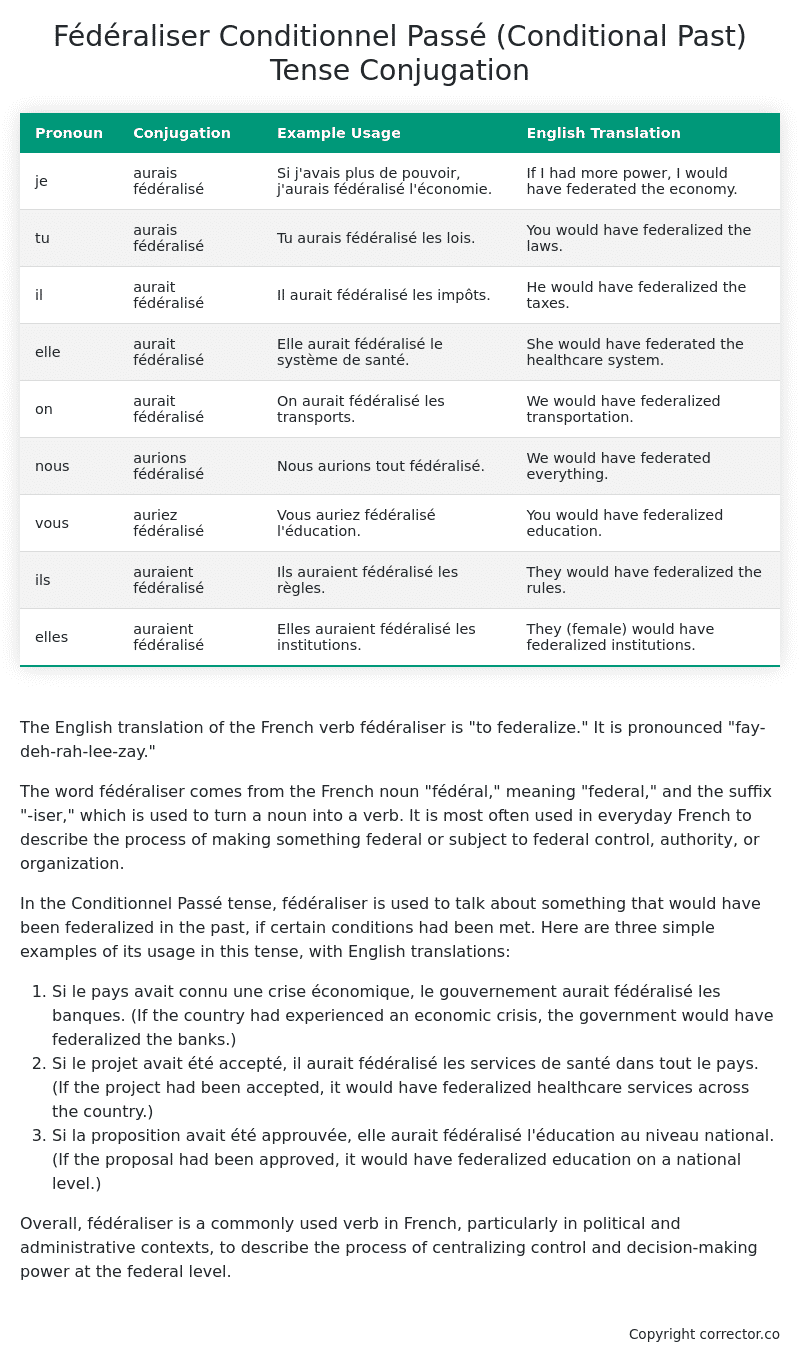Conditionnel Passé (Conditional Past) Tense Conjugation of the French Verb fédéraliser
Introduction to the verb fédéraliser
The English translation of the French verb fédéraliser is “to federalize.” It is pronounced “fay-deh-rah-lee-zay.”
The word fédéraliser comes from the French noun “fédéral,” meaning “federal,” and the suffix “-iser,” which is used to turn a noun into a verb. It is most often used in everyday French to describe the process of making something federal or subject to federal control, authority, or organization.
In the Conditionnel Passé tense, fédéraliser is used to talk about something that would have been federalized in the past, if certain conditions had been met. Here are three simple examples of its usage in this tense, with English translations:
- Si le pays avait connu une crise économique, le gouvernement aurait fédéralisé les banques. (If the country had experienced an economic crisis, the government would have federalized the banks.)
- Si le projet avait été accepté, il aurait fédéralisé les services de santé dans tout le pays. (If the project had been accepted, it would have federalized healthcare services across the country.)
- Si la proposition avait été approuvée, elle aurait fédéralisé l’éducation au niveau national. (If the proposal had been approved, it would have federalized education on a national level.)
Overall, fédéraliser is a commonly used verb in French, particularly in political and administrative contexts, to describe the process of centralizing control and decision-making power at the federal level.
Table of the Conditionnel Passé (Conditional Past) Tense Conjugation of fédéraliser
| Pronoun | Conjugation | Example Usage | English Translation |
|---|---|---|---|
| je | aurais fédéralisé | Si j’avais plus de pouvoir, j’aurais fédéralisé l’économie. | If I had more power, I would have federated the economy. |
| tu | aurais fédéralisé | Tu aurais fédéralisé les lois. | You would have federalized the laws. |
| il | aurait fédéralisé | Il aurait fédéralisé les impôts. | He would have federalized the taxes. |
| elle | aurait fédéralisé | Elle aurait fédéralisé le système de santé. | She would have federated the healthcare system. |
| on | aurait fédéralisé | On aurait fédéralisé les transports. | We would have federalized transportation. |
| nous | aurions fédéralisé | Nous aurions tout fédéralisé. | We would have federated everything. |
| vous | auriez fédéralisé | Vous auriez fédéralisé l’éducation. | You would have federalized education. |
| ils | auraient fédéralisé | Ils auraient fédéralisé les règles. | They would have federalized the rules. |
| elles | auraient fédéralisé | Elles auraient fédéralisé les institutions. | They (female) would have federalized institutions. |
Other Conjugations for Fédéraliser.
Le Present (Present Tense) Conjugation of the French Verb fédéraliser
Imparfait (Imperfect) Tense Conjugation of the French Verb fédéraliser
Passé Simple (Simple Past) Tense Conjugation of the French Verb fédéraliser
Passé Composé (Present Perfect) Tense Conjugation of the French Verb fédéraliser
Futur Simple (Simple Future) Tense Conjugation of the French Verb fédéraliser
Futur Proche (Near Future) Tense Conjugation of the French Verb fédéraliser
Plus-que-parfait (Pluperfect) Tense Conjugation of the French Verb fédéraliser
Passé Antérieur (Past Anterior) Tense Conjugation of the French Verb fédéraliser
Futur Antérieur (Future Anterior) Tense Conjugation of the French Verb fédéraliser
Subjonctif Présent (Subjunctive Present) Tense Conjugation of the French Verb fédéraliser
Subjonctif Passé (Subjunctive Past) Tense Conjugation of the French Verb fédéraliser
Subjonctif Imparfait (Subjunctive Imperfect) Tense Conjugation of the French Verb fédéraliser
Conditionnel Présent (Conditional Present) Tense Conjugation of the French Verb fédéraliser
Conditionnel Passé (Conditional Past) Tense Conjugation of the French Verb fédéraliser (this article)
L’impératif Présent (Imperative Present) Tense Conjugation of the French Verb fédéraliser
L’infinitif Présent (Infinitive Present) Tense Conjugation of the French Verb fédéraliser
Struggling with French verbs or the language in general? Why not use our free French Grammar Checker – no registration required!
Get a FREE Download Study Sheet of this Conjugation 🔥
Simply right click the image below, click “save image” and get your free reference for the fédéraliser Conditionnel Passé tense conjugation!

Fédéraliser – About the French Conditionnel Passé (Conditional Past) Tense
Formation
Common Everyday Usage Patterns
Expressing Unreal Past Scenarios
Polite Requests or Suggestions
Expressing Doubt or Uncertainty
Interactions with Other Tenses
Conditional Present
Indicative Past Tenses
Conditional Future
Summary
Want More?
I hope you enjoyed this article on the verb fédéraliser. Still in a learning mood? Check out another TOTALLY random French verb conjugation!


